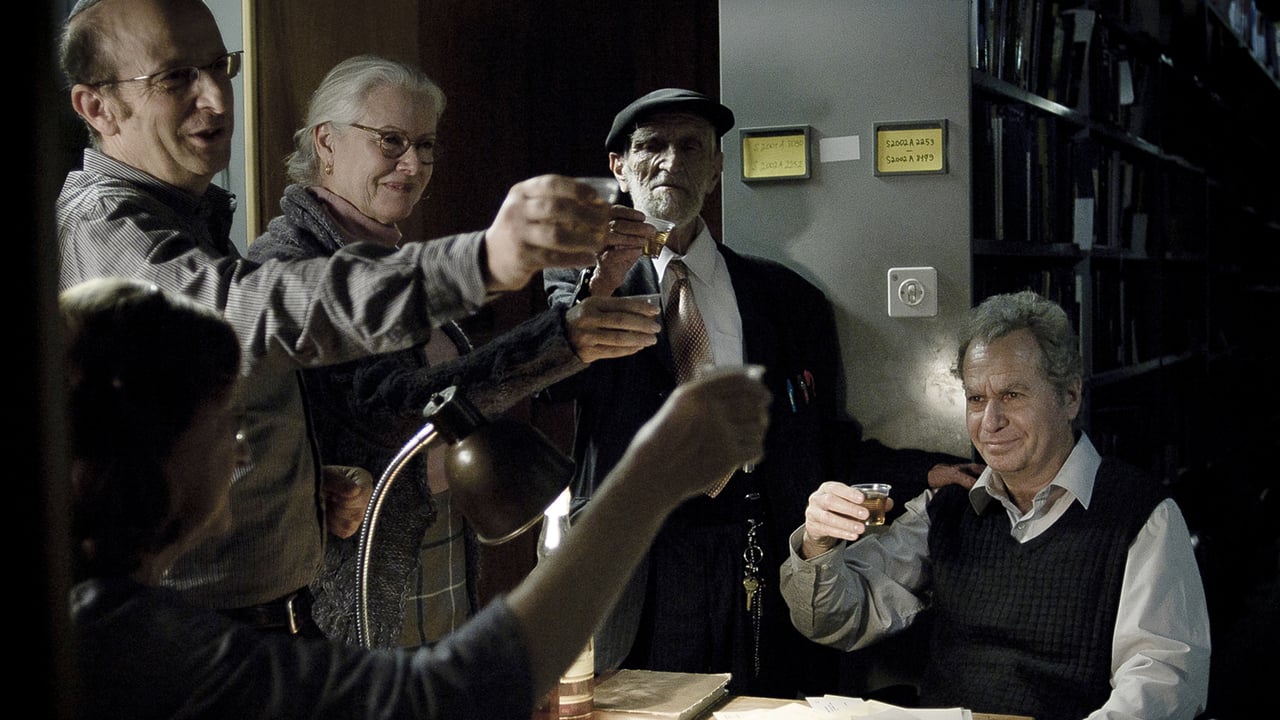

FOOTNOTE is the second Israeli film I've seen and while it felt rather insular in the cultural sense, it did explore some interesting themes and had a great sense of humor. The story is about a father and son, both professors of Talmudic literature. The father has largely been forgotten, his only significant achievement being a mention in a footnote in someone else's book, while his son is more celebrated. However, the dynamic between them changes when the father is selected (errantly) to receive the prestigious Israel Prize for his life's work. One thing the film does really well is explore the sometimes contentious relationship between parent and child. Eliezer (father) and Uriel (son) Shkolnik both have the same profession, yet the son's success in light of the father's failure certainly must have weighed heavily on both of their consciences. And when Eliezer is mistakenly nominated to receive the Israel Prize, his son comes to his defense since it would vindicate the decades of work for which he had previously gone unrecognized. There was also the subtle element of comedy and self-deprecating humor that seems to be part and parcel of the Jewish experience. It wasn't exactly laugh-out-loud hilarious, but there was some excellent situational humor as well as some ribbing on cutthroat competition in academia. Still, given the subject material it was a little hard for me to get into the film completely. The single element which I did connect with was the idea that a parent at some point might give up on their child, as I have had similar fears in the past. The film also had a somewhat unsatisfying ending, although it probably didn't have to show everything in order to be effective. The film was subversive enough without seeing what you know is coming. If there's one actual complaint I have, it's that the score was a little overpowering at times. Sometimes, more is less. Overall, the subject of academia is something that's a little too "inside baseball," particularly when it's about the Talmud (I'm not a Jew), but FOOTNOTE has some interesting themes that allow you a way into this story about a father-son rivalry.
... View MoreI would like to keep this note very short. A lot of useful reviews have already been posted on this film. The only thing that I would like to comment upon, is the ending.I believe the ending makes a lot of sense. It actually summarizes the complete concept of the movie. It makes you think about how the relationship between the father and the son will continue. It also reflects how their relationship will impact the further evolution of the family. The tension, the secrets, how will they evolve further ... It expresses that family values can go very deep. A son who has deep respect of his father, and a father, who got blind of his own frustrations, not seeing this respect. And when he finally finds out the love of his son, he ... See the film yourself. Then read back what i wrote here ...If the ending would have been different, it would have ruined the film.Sven
... View MoreEliezer Shkolnik is seated at a ceremony honoring his son Uriel Shkolnik's admission to the Israel Academy of Sciences and Humanities an honor that has never been accorded to him. He appears uncomfortable barely forcing himself to rise to his feet in perfunctory applause before quickly sitting down. Hence begins "Footnote" the brilliant Israeli 2011 Oscar nominee for Best Foreign Language Film. Both Shkolniks are Talmudic researchers at Hebrew University in Jerusalem but that is where the similarity ends. Eliezer is an obstinate traditionalist and loner who rejects new ideas and the establishment that embraces them. As a result he is relegated to obscurity by his colleagues who deny him any recognition beyond the dusty footnote he received in the book of an old revered scholar. Uriel on the other hand is popular and adopts the changes his father despises. One day Eliezer receives a phone call informing him that he is the recipient of the Israel Prize. What he doesn't know is that the call is a mistake. It is his son Uriel who is the intended recipient. The roles of father and son are beautifully played by Shlomo Bar-Aba and Lior Ashkenazi respectively. Micah Lewensohn is excellent in a supporting role as a rival of Eliezer's who refuses to relent in his dislike of his old academic adversary. The screenplay by director Joseph Cedar was inspired by a real life incident in which he received a phone call notifying him of an award he suspected was really intended for his father. Anyone interested in something fresh at the movies should find this film compelling and thought provoking. "Footnote" asks us how much does a father owe a son and vice versa. It also asks us to think about the different ways we have of arriving at the truth and how much we're willing to sacrifice for it.
... View MoreYou really must be Israeli to understand it all, but some ideas can get through to anyone. Cedar the producer was once phoned up and told he would receive the "israel prize". He immediately told the man who phoned him that he should be telling his father and not him. So this is the origin of the film. What happens if the father is phoned (instead of his son) and has been waiting for the prize for many years, only the politics in the academy have prevented it? The reaction of the son (who has already had many awards) is exemplary, much to the disdain of the head of the committee who hates his father. And this message of "honour thy father" is something we should all be getting from the film, especially in a world (academic world too!) where everyone seems to be looking only to increase his own honour.
... View More